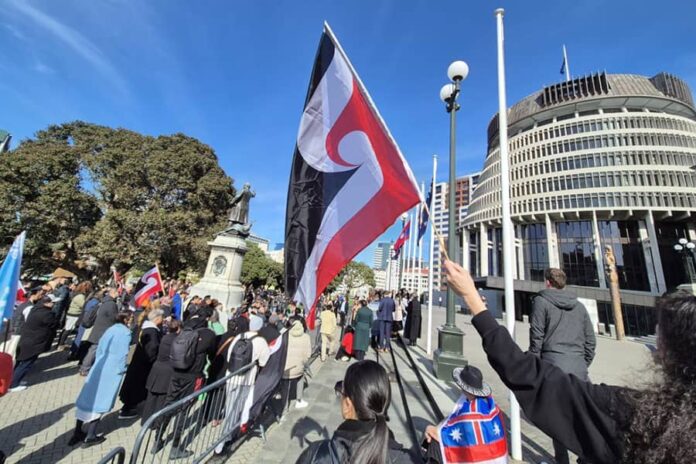A proposed piece of legislation aimed at redefining the foundational treaty between the British Crown and Māori leaders has sparked significant political unrest in New Zealand.
Although the bill is unlikely to pass, it has become a focal point for discussions on race relations and represents a crucial moment in the ongoing 180-year dialogue regarding how New Zealand fulfills its commitments to Indigenous peoples from the time of colonization.
On Tuesday, tens of thousands are anticipated to gather in Wellington for the culmination of a week-long protest march, following the Māori custom of hīkoi, or walking, to highlight violations of the 1840 Treaty of Waitangi.
Last week, Māori politicians brought New Zealand’s parliament to a standstill by staging a haka as a form of protest, an event that garnered international attention.
The treaty, regarded as the cornerstone of New Zealand’s history, was signed during colonization by delegates from the British Crown and 500 Māori chiefs. It established the foundational principles for the relationship between the Crown and Māori, existing in both English and Māori versions.
The agreement assured Māori the same rights and privileges as British citizens; however, the English and Māori texts varied regarding the extent of authority that chiefs were relinquishing over their governance, territories, and independence. Over the years, the Crown violated both versions of the treaty.
By the mid-20th century, Māori language and culture had significantly declined—Indigenous people frequently faced restrictions on their cultural practices—tribal lands were seized, and Māori experienced disadvantages across various measures.
In response to a rising protest movement among Māori, for the last five decades, New Zealand’s courts, legislators, and the Waitangi Tribunal—a permanent institution established to resolve treaty-related issues—have sought to reconcile the discrepancies between the treaty’s texts and aimed to remedy violations by interpreting its principles in their rulings.
The principles are designed to be adaptable, yet they are often characterized by three key aspects: collaboration with the Crown, safeguarding Māori interests, and involvement in the decision-making process.
Although Māori continue to face various forms of disenfranchisement, the integration of treaty acknowledgment into legal frameworks and efforts for reparations have transformed societal dynamics over time.
The Māori language has undergone a revival, with everyday terms becoming widely used, even by those who are not Māori. Additionally, measures have been implemented to address the inequalities that Māori frequently encounter.
Billions of dollars have been negotiated in settlements between the Crown and various tribes due to violations of treaty agreements, particularly regarding the extensive appropriation of Māori land and natural resources. Nevertheless, some New Zealanders express dissatisfaction with these reparations.
They have found a spokesperson in David Seymour, a lawmaker and head of a small libertarian political party that garnered less than 9% of the vote in last year’s elections but gained significant influence through a coalition agreement.
Seymour’s proposed legislation aims to establish clear definitions for the principles of the treaty and extend their application to all New Zealand citizens rather than just Māori individuals. He argues that the fragmented interpretation of the treaty has created ambiguity and led to preferential treatment for Māori people.
However, his proposal faces strong opposition from former prime ministers across both political spectrums, as well as from 40 prominent legal experts and thousands of Māori and non-Māori citizens who are marching across the country in protest.
The bill is unlikely to succeed in its final vote; although it passed an initial vote on Thursday due to political maneuvering, many supporters are not anticipated to back it again. Critics argue that this legislation could disrupt constitutional stability and undermine rights guaranteed by the treaty that are currently protected by law.
Additionally, they have criticized Seymour—who identifies as Māori—for inciting negative sentiments towards Indigenous communities. Peaceful walking protests have long been a tradition among Māori people and have historically surfaced during pivotal discussions about treaty rights.
Authorities in the nation with a population of 5 million anticipate that 30,000 individuals will walk through Wellington toward Parliament this Tuesday. As they go to Wellington, groups of up to 10,000 have participated in marches in various cities.
While many are demonstrating against Seymour’s legislation, others are voicing their discontent over several policies related to Māori affairs implemented by the center-right administration. This includes a directive initiated by Seymour that instructs public agencies not to tailor policies aimed at addressing inequalities Māori face.

